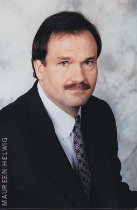
When Michael A. Fitts, the Robert G. Fuller Jr. Professor of Law who was recently chosen to become dean of the Law School, was asked what he brought to the post, he replied: “I have a taste for institution-building. I enjoy identifying promising faculty; I enjoy recruiting promising faculty; I love the school; and I think I can communicate that enthusiasm to alumni and supporters of the institution.”
Asked what the Law School’s biggest challenges were, he answered pithily: “Raising money and recruiting faculty.”
Fitts, whose selection was announced in March, succeeds Colin S. Diver, who stepped down last August after a decade as dean. During the interregnum, Charles W. Mooney, professor of law and associate dean for academic affairs, filled in as interim dean. On March 23, Fitts’ appointment became official when it was confirmed by the University trustees.
Dr. Judith Rodin CW’66, president of the University, called Fitts a “first-rate scholar and teacher who is the embodiment of the [Fuller] chair he holds, which honors legal scholarship and the ability to communicate the essential principles of law and a humanistic understanding of those principles.” In addition, she said, he has “superb academic judgment and proven leadership and administrative skills.”
In recent years, the University has tapped its own faculty for a number of top posts, including the Wharton School’s Patrick Harker CE’81 GCE’81 Gr’83 and the Health System’s Peter Traber (see p. 22) [“Gazetteer,” March/April] ; SEAS’s Eduardo Glandt GCh’75 Gr’77 [“Gazetteer,” Jan/Feb], SAS’s Samuel Preston and Provost Robert Barchi Gr’72 M’72 GM’73, not to mention Rodin. Fitts has been a member of the Penn faculty since 1985, becoming associate professor in 1990, professor in 1992 and the Fuller Professor in 1996. A West Philadelphia native, he received his bachelor’s degree from Harvard College in 1975 and his law degree in 1979 from Yale University, where he was editor of the Yale Law Journal. He served as law clerk to the late Hon. A. Leon Higginbotham Jr. Hon’75 from 1979 to 1981, and for the next four years was an attorney advisor in the Office of Legal Counsel at the U.S. Department of Justice.
Asked about the school’s strengths, he pointed to the faculty. “There are a lot of substantive areas in which we have really top faculty,” he said. “Clearly, in jurisprudence, criminal law, some areas of constitutional law, in corporate law and certain related areas, we have lots of good faculty. The faculty as a whole is first-rate. The problem is, our faculty is too small in a number of areas, and given the splintering of knowledge and law, it’s important to have a number of people to play off and interact with and provide visibility in a particular field.”
Fitts, who has written widely on political institutions, is the author of “Back to the Future: The Supreme Court’s Response to the Changing Goals and Functions of Modern Political Parties,” which will be included in a forthcoming book titled, The Supreme Court and the Electoral Process. And the dynamic of change is not an unfamiliar subject for him.
“There are clearly areas in which the law is moving and in which this Law School has to move,” he said. He cited corporate law, law and technology, health law, law and communication, and constitutional law as “areas that are going to be very important in the 21st century—areas in which we either have strengths or have the capacity to build in, given the schools and resources within the University and our own resources within the Law School itself.”
On the whole, he added, the school has “become more interdisciplinary, and has made many more connections with other schools within the University, both at the faculty and the student level. In the future, I would like to see both of those changes accelerating.”




